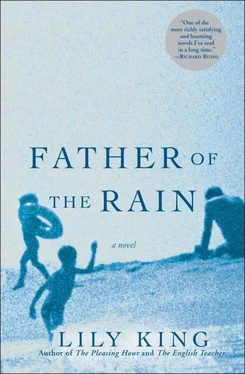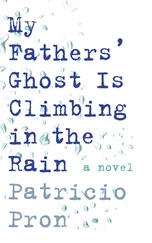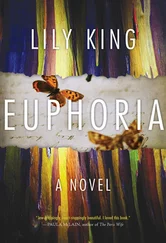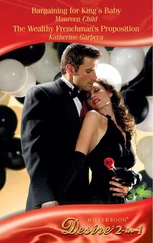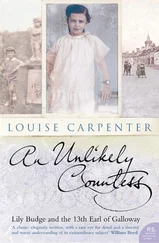“Who?”
He looks down at his hands. “A girl I used to know.”
“But she’s not really dead.”
“No.”
“Bad breakup?”
He nods. I wait to see if he’ll say anything more about it.
“You ever had your heart smashed to pieces?” he asks.
“Yes.”
“I mean really broken. Everybody walks around saying they’ve had their heart broken, but they mean they went out on two dates and they really liked the guy and he never called back. Or they’re like my brother, who went out with this truly awful girl for two years and all he did was complain and make fun of her and then she slept with someone else and he said his heart was broken in two. And then he had a new girlfriend by Tuesday. I’m not talking about that kind.”
“You’re talking about waking up every morning feeling like someone has beaten you up and you can’t quite take a regular breath.”
Neal shuts his eyes. “Yes.”
We sit there. Cars goes by. There’s a copy of Simone de Beauvoir’s Second Sex in the window now. I read it last winter for the first time. One morning I was reading it on Jonathan’s couch while he vacuumed. He was much neater than I was. I’ve never owned a vacuum cleaner. “I’m the third sex,” he said as he went by. “But ain’t nobody written a book about me yet.”
“What happened?” Neal asks.
“I lost the job and the guy. No deferments for either.”
“He’ll come around.”
“I don’t think he will. I would have heard from him by now.” I still jump every time the phone rings, still feel hopeful when the mail arrives. I’ve called information, but there’s no listing for him on Paloma Street or anywhere else in the Bay Area.
“What’s his name?”
“Jonathan.” It hurts to say the syllables. I need to get off the subject. “And your Dead Girl?”
He shakes his head. “I don’t say it anymore.”
“What happened?”
“Too long a story.”
“I’ve got time.”
“I don’t.”
“Just give me a detail.”
“Started freshman year of college and ended six years later in a Pottery Barn at the Chestut Hill Mall.”
I lean back against the doorjamb. “C’mon. A few more.”
“Don’t do that. Don’t get all settled in for a good yarn. Girls are always like that, always trying to leech everything out of you.”
“No, girls are not always like that. Women —those are people of the female sex eighteen and over — aren’t either. I happen to be interested because I am a behavioral anthropologist. Or was. What happened at the Pottery Barn?”
“She was going to move in with me. Here.” He points upstairs. “I wouldn’t pay for half the bed we were buying. I had the money; I just thought it should be clean — she buys the bed, I buy the couch. Just in case. And she turned it into this whole big thing about trust and commitment.”
“Which it sounds like it was.”
“Yeah. I’ve had a few years to replay the scene about ten thousand times. It was.”
“Where is she now?”
“I’m not sure. Vermont, maybe. Your turn. Tell me something about Jonathan.”
I wish I hadn’t told him his name. It feels like I’ve given him a gun with bullets.
He leans back on his elbows.
“Don’t get comfy.”
He laughs. “Just go.”
But there is no story yet. It’s just a tight searing knot.
“Hey, it’s okay,” he says, giving me the slightest shoulder nudge.
A woman and her daughter come up the steps with a long summer reading list. “We’re a little late, but she reads fast,” she says, handing the sheet of paper to Neal.
“Ashing Academy,” he says, waving it at me.
“Renaissance Cup, 1978,” I say to them, pointing at Neal who’s heading inside.
“Really?” the mother says, impressed.
He points back at me. “You do that again and you will be banned from this store.” And then he is all business, gathering the books for them, and I rouse the dogs from their naps and we go home.
I mail invitations to my father’s closest friends, the ones who have not sided with Catherine, the ones he speaks of more or less fondly. I buy tiki torches and hide them in Neal’s storage room. In the thrift shop I run into the bohemian woman who is often late to the meetings, and she tells me her name is Patricia and that she’s enjoyed getting to know my father, so I invite her, too.
If I could make my father deaf for two weeks I would. I am terrified someone will slip and mention the party. When we are downtown together, I feel quite ready to lunge at the throat of anyone I suspect is about to blurt out the secret. Every time he comes home from the hardware store or the dump or a meeting, I wait for him to tell me he does not want a fucking surprise party. And when finally, very casually, I ask what he might like to do on his birthday, he says, “Nothing. I hate birthdays.”
I reassure him that we’ll have a quiet dinner at home with the dogs. And when the night comes I tell him I want to make a special meal and ask him to drive himself to his meeting. It’s the first time I haven’t accompanied him, but it feels fine. It feels like it’s time. As soon as he’s gone, Philomena and her team arrive and we begin quickly setting up tables and chairs on the lawn beside the poolhouse. Mrs. Bridgeton comes early with several big pots of hydrangeas that she puts around the pool, and helps me arrange the flowers and candles for the tables.
“I remember you in a fuzzy pink bathrobe passing out hors d’oeuvres at all the parties your mother used to have. You were such a precious little thing. And now here you are, throwing a grown-up party all by yourself.”
The pale blue hydrangeas look beautiful. It’s exactly what my mother would have done.
Neal has volunteered to waylay my father outside the church. I told him to ask my father if he’d seen Billy Hatcher, the Red Sox outfielder, steal home a few weeks ago. That conversation will last a good half-hour. My father cannot stop reliving the moment.
At seven-thirty my father’s old friends begin appearing around the pool. I asked them to park well beyond our driveway so they come on foot. They come in summer attire, cotton prints in bright colors. They are a clean, well-groomed generation. They smell of flowers and spices and booze. I warned them in the invitation that no alcohol would be served, so they’ve come well lubricated.
Mrs. Keck takes hold of my hands and won’t let go. She is much more frail than I remember her. “This is a wonderful thing you’re doing for your dad.” Her head wobbles. Parkinson’s. She looks around at the tables covered in white cloths, the delphinium in jars and the torches lit and flashing in the dusk. “A very wonderful thing.”
And then the phone rings in the poolhouse. It can mean only one thing. Neal didn’t find my father outside the church. He is AWOL. I pick it up.
“The eagle has flown.” I can tell he’s smiling. And then he hangs up.
I am scared. I’ve lost most of the feeling in my hands. My father’s car turns up the driveway. I can see it through the tree trunks, slowing as he makes the turn and sees the pool and the tables and the torches. He comes to a full stop before the poolhouse. His window is down.
“What the hell are you people doing here?”
“Surprise!” everyone says in unison, though I never suggested anything of the sort.
“Jesus Christ,” he says, and drives on into the garage.
When he comes across the lawn, people call surprise again and he shakes his head. People go to greet him. His face is red. I can’t tell if his smile is fake or real. One of Philomena’s helpers approaches him with a plate of smoked salmon on crackers and he takes one and nods his thanks.
Читать дальше
